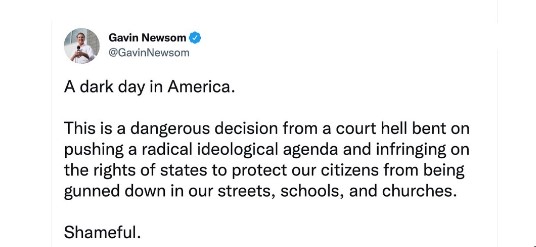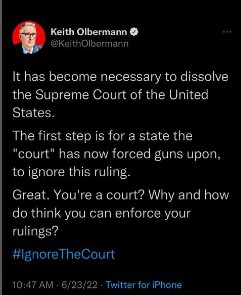Within the past couple of weeks, I have noticed a disturbing trend, in which politicians and other public figures have begun to claim that they have a right to violate the rights of other people.
The first example that I noticed is this June 23 tweet by California Governor Gavin Newsom:

First of all, it is disgusting and reprehensible that someone would characterize a Supreme Court decision preserving individual liberty a “dark day” or “shameful.” These words are the exact opposite of the truth. Additionally, I am not sure why Newsom would speak of a “radical ideological agenda” as if that is something bad. How radical or moderate something is has nothing to do with whether it is good or bad, and ideological simply means having to do with moral beliefs, which also has nothing to do with whether the thing in question is good or bad. But most importantly, Newsom, preposterously, claims that by preserving individual liberty, the Supreme Court is somehow infringing upon the rights of states. In other words, he is presuming that states have a right to violate people’s rights. Not only is this false, but the fact that someone would make such a presumption is shocking to the conscience. There is no right of states to protect their citizens from being gunned down. Of course, states have a right to ban the gunning down of people, which all states have (obviously) done. But states do not have a right to enact policies designed to make it difficult or impossible to gun down other people, because this necessarily entails banning activities (such as the ownership and/or possession of various types of guns) that do not harm anyone. And this violates the rights of innocent people. By claiming that states have a right to enact such policies, Newsom is claiming that states have a right to violate people’s rights. But no one has the right to violate the rights of others. The whole point of rights is that they cannot be violated. It is disturbing that this would even need to be stated, but there is no right to violate people’s rights.

This tweet by Keith Olbermann is disgusting for similar reasons. First of all, Olbermann states that it has become necessary to dissolve the Supreme Court, even though there is absolutely no basis for stating such a thing. The fact that an institution made a decision with which Olbermann disagrees is not a reason to dissolve that institution. Second, Olbermann puts the word “court” in quotes, implying that the Supreme Court is somehow not actually a court. But the Supreme Court actually is a court, so there is no reason for Olbermann to do this. Most relevant to my main point is Olbermann’s reference to states that the Supreme Court has allegedly “forced guns upon.” This wording makes no sense and demonstrates that Olbermann shares Newsom’s false, preposterous, and immoral presumption that states have a right to violate people’s rights. In reality, states do not have any right to be free of guns, because the objects that people own and/or carry are none of a state’s business. Therefore, state policies that interfere with people’s ability to own and/or carry guns violate people’s rights. And states don’t have a right to violate people’s rights. Therefore, stopping states from violating people’s rights is exactly what the Supreme Court should do. Olbermann somehow thinks that it is good for states to violate people’s rights, and bad for the Supreme Court to make them stop doing this, which is the opposite of the truth.

On a similar note, this article by the Daily Kos makes the common mistake of using the word “radical” as if this is somehow bad, which it is not, for reasons that I explained above. Regarding the reference to the “belligerent gun rights community”… it is absolutely shocking that people might be belligerent after having their fundamental rights relentlessly ridiculed and trampled on for decades. I can’t imagine why anyone would be belligerent in such circumstances. Additionally, the author of this article, Joan McCarter, makes the same mistake as Newsom and Olbermann when she refers to “states’ right to control guns.” As explained above, states do not have a right to control guns, because doing so violates people’s rights. And as also explained above, states do not have a right to violate people’s rights. No one does. Furthermore, McCarter bemoans the possibility that because of the aforementioned “belligerent gun rights community,” states might be “forced to buckle” and actually respect people’s rights. But states are morally required to respect people’s rights, so they should be forced to do so. Forcing states to respect people’s rights is exactly what ought to happen.

And finally, we have New York Governor Kathy Hochul, who preposterously claims that there are no restrictions on gun ownership, something that anyone who has ever attempted to purchase a gun would know to be blatantly false. In reality, there are far more restrictions on gun ownership than speech. Has Hochul ever been required to take a training course, fill out an application, pay a fee, go to her local police station, and be fingerprinted, before being allowed to voice her opinion on a topic? Somehow I think not. More to the point, just like the above-discussed public figures, Hochul claims the existence of “our right to have reasonable restrictions.” But such a right does not exist. Neither Hochul, nor any other person, institution, or entity, has any right to have restrictions on people’s ability to own and/or carry guns, because having such restrictions violates people’s rights. And there is no right to violate people’s rights.
In conclusion, to claim that governments have a right to violate people’s rights demonstrates utter moral bankruptcy, complete lack of logic, and an incredibly twisted and warped understanding of rights. It is disturbing that so many public figures have made public statements endorsing such an immoral, illogical, and simply wrong idea.
Source for all these quotes: Firearms Policy Coalition via Instagram
